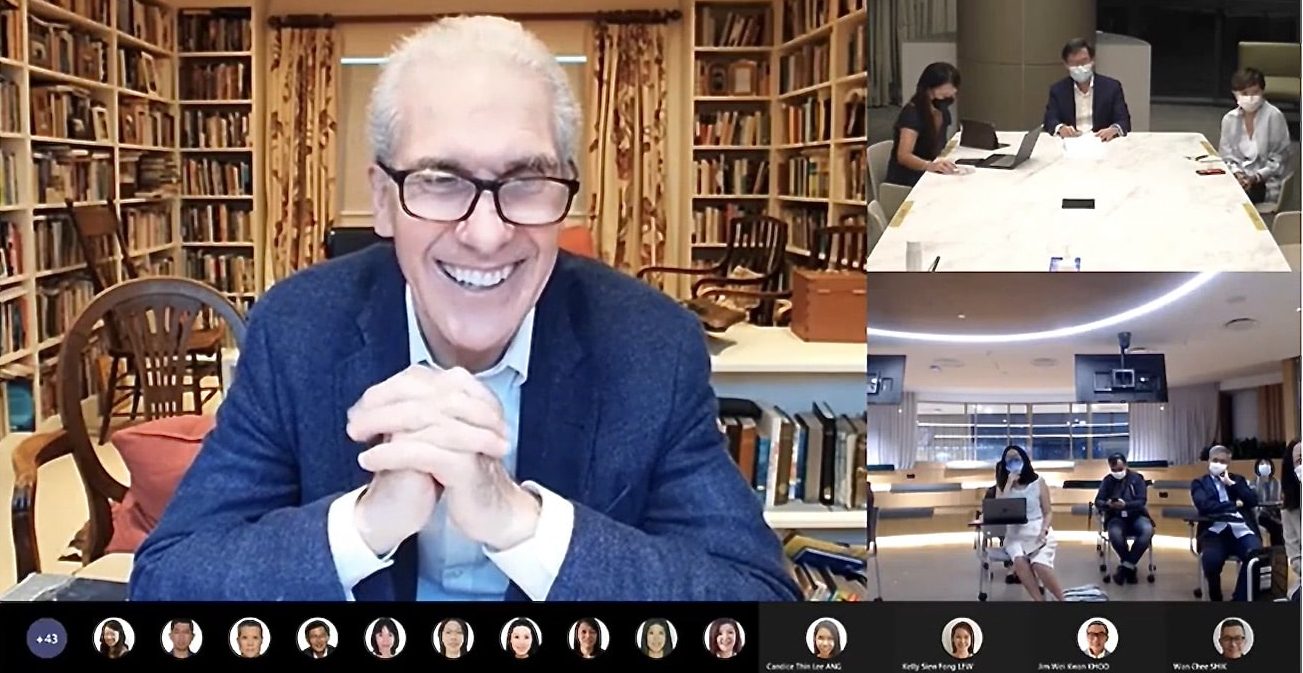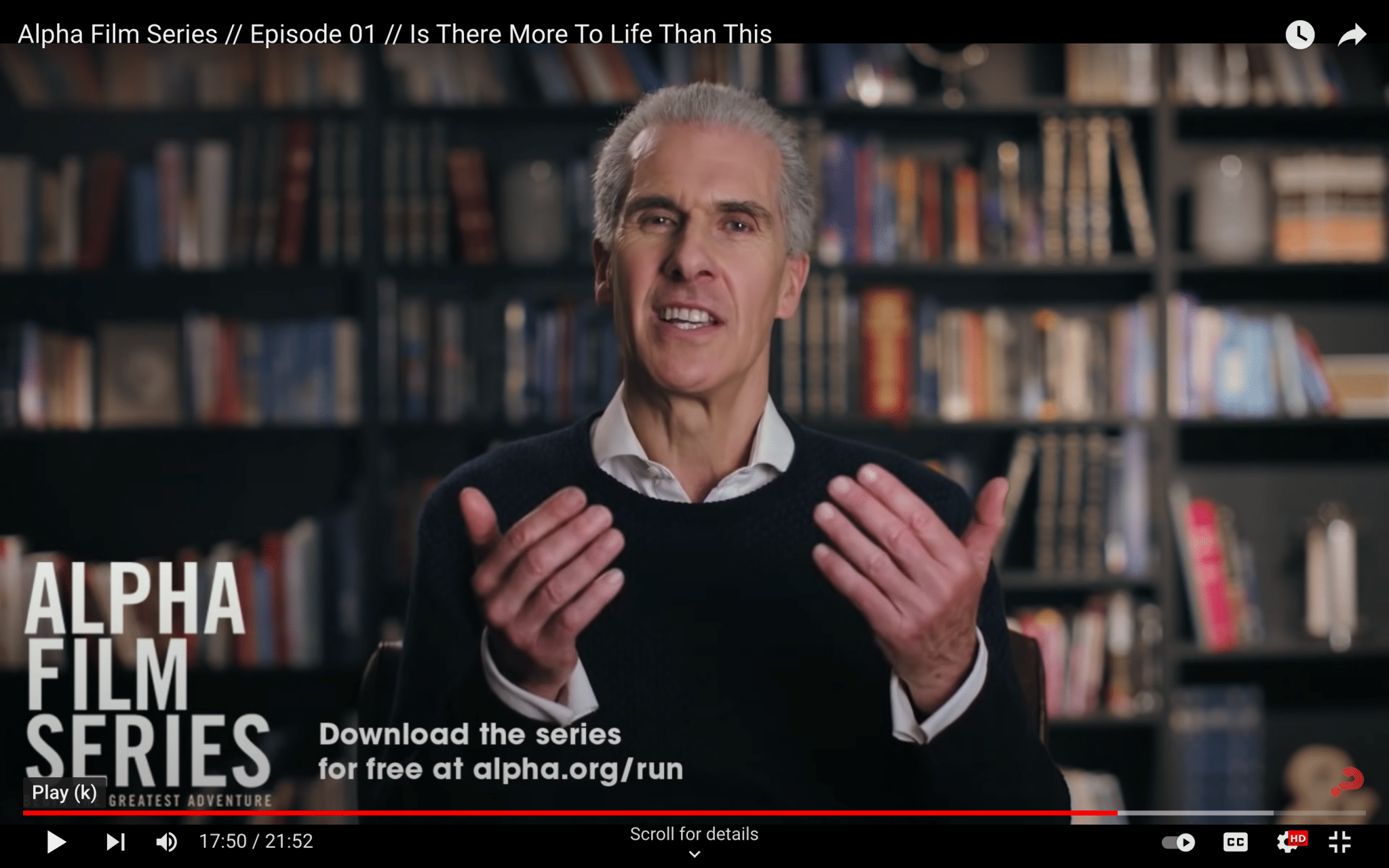“Be open to being challenged. Truth doesn’t mind being questioned”: Alpha pioneer Nicky Gumbel
by Gemma Koh // May 9, 2022, 4:56 pm

“Always be willing to give an answer to anyone who asks you to give an account. But do it with gentleness and respect," says Nicky Gumbel, who leads Alpha globally. Screengrab of the Far East Organization webinar with Nicky Gumbel.
Alpha pioneer Nicky Gumbel who says he is “allergic to shopping”, shared an account of the security alarm going off as he and wife, Pippa, and four other shoppers were leaving a store. One by one, the shoppers were made to go through security again.
The alarm tripped as Nicky went through. He was pulled to one side.
It turns out that the security tag on the blue sweater (“the same colour as all my other sweaters”) they had bought for him had not been removed.
Besides the “false guilt” he felt, he admits in the video that he sometimes experiences real guilt. But God sent His Son to die for us on the cross, taking all of our guilt, everything we have done wrong.
It is one of many heartwarming anecdotes the couple share, often with self-deprecating humour, in the film series used by communities that run the Alpha course. Nicky, now 66, leads Alpha worldwide.
The relatable stories and winsome charm of Nicky, Pippa and their co-hosts, plus the powerful testimonies from people of all walks of life from around the world are but a few reasons behind the appeal of Alpha that has introduced many to Jesus.
The Alpha course originated in 1977 at Holy Trinity Brompton (HTB) in the UK with just six people. It evolved over the years under different leaders.
Nicky started helming Alpha in 1990, and skewing it towards people outside the Church. Its loving, non-judgemental, no-pressure approach welcomes all to ask questions about the Christian faith. The course has been taken by almost 30 million people (and counting) around the globe.
Nicky, will be stepping down as Vicar of HTB in July 2022 – a role he has held since 2005.
In March, staff of Far East Organization in Singapore, got a taste of Nicky’s wisdom and disarming charm (and reference to his iconic blue sweater) first hand via a webinar. Salt&Light was invited to the session.
It was part of their internal Coram Deo (Latin for “in the presence of God”) series in which staff have the opportunity to learn from Christian leaders across different disciplines.

The conversation with Nicky Gumbel (left) was hosted by Raphael Saw (right), Chief Operating Officer of the Agape Business Group at Far East Organization, who also oversees its social enterprise arm. Screenshot from the session.
This article continues on from Part 1 where Nicky shared about how God opened the door to what he is doing today.
In Part 2 below, Nicky shares practical advice on handling criticism and fame, as well as living out one’s faith in the marketplace and at home.
How do Christians feel the presence of the Lord at work?
Paul talks about five categories: Apostles, prophets, evangelists, pastors, teachers. But he says their task is to equip the saints – that’s you. Every Christian in the New Testament is a saint – God’s people – for the work of ministry.
So you’re on the frontline of Christian ministry. You are the ministers. So what you do from Monday to Friday, is representing Jesus in the workplace.
And it is tough in the business world to live out your Christian faith in an environment that’s often hostile to faith.
You’ve got to be as Jesus says, “wise as serpents and innocent as doves”.
You’re having to do business deals that are complex, and act with honesty and integrity. You’re showing Christian values in a world where maybe people on the other side are not using Christian values.
And you don’t want them to get one up on you by devious means. You’ve got to be as Jesus says, “wise as serpents and innocent as doves” (Matthew 10:16). Don’t be naive about what’s going on, but on the other hand, don’t be cynical.
The most important thing is love.
God loves you. Everyone wants to be loved. Everyone wants purpose. Everyone wants to belong.
That’s why people come on Alpha. Because they find that love, the purpose of their life in relationship with God, through Jesus. People join gangs because they want to belong, even with the cost of it. The Church is not just an organisation to join, it is a family where you belong.
And so in the workplace, the key characteristic to seek to demonstrate is love. We know that we’re loved, and we want to love other people. Loving people means serving them.
The distinctive feature of Christian leadership is the reverse pyramid. In the world, the president is at the top [indicates an apex with his hands], the people who work for him below that.
In the Church, it’s the other way around. The pastor is at the bottom, and we are equipping the saints at the top for the work of ministry.
Servant leadership is now popular in the world. But it’s Jesus who modelled that.
When people said, “I want to be great”, He said, “Don’t seek to be great. Seek to serve. Even the Son of man didn’t come to be served, but to serve.” (Mark 10:35-45)
So whenever we speak about our faith, all we are saying is hopefully, “I’m better than I was before”.
What Peter says of a husband-wife relationship, which is quite similar to a workplace situation: “Don’t keep talking about it, live it out.”
If you are constantly talking to your colleagues about your faith, they will probably avoid you.
Whereas if they see in your life that you are loving, caring, serving, have integrity, they see something attractive – that you’re radiating Jesus – then they may say, “Tell me”.
Peter also says: “Always be willing to give an answer to anyone who asks you to give an account. But do it with gentleness and respect.” (1 Peter 3:15)
So whenever we speak about our faith, we’re not saying “I’m better that you.” All we are saying is hopefully, “I’m better than I was before”.
The most loving thing you can do to a colleague who doesn’t know Jesus is to (invite them to Alpha or church and) say: “Come and see.”
In this misleading social media era, how do enterprises build trust and truth?
I came across a quote yesterday: “Truth does not mind being questioned. A lie does not like being challenged.”
If you’re telling the truth, you are open to being challenged. And you can explain what the truth is.
We live in a sad world where there is a lot of “fake news”. So, the world has become a very tricky place to navigate in terms of truth.
You can lose trust in a minute. But it takes many, many years to build through consistency and integrity.
But Jesus said, “I am the truth.”
Ultimately, I don’t have the truth, no one has the truth, but Jesus is the truth. He is the yardstick by which all truths should measured.
Trust is really, really important. And you build trust by integrity, by telling the truth.
You can lose trust in a minute. But it takes years to build through consistency and integrity. You can never take it for granted because you could lose it very, very quickly. And so we just have to pray and seek to live lives of integrity.
Rick Warren talks about living in such a way that if people want to accuse you, they will have to make things up. And they will.
People will always criticise us. We can’t stop that, we can’t protect our reputation.
But we can guard our character.
The higher you climb in any organisation, the more criticism you will receive. As you put your head above the pulpit, criticism rises.
If you don’t want any criticism, do nothing, say nothing, be nothing and you won’t be criticised at all.
Handling criticism is very important. We need to take it seriously, because truth doesn’t mind being questioned.
If we are criticised, we can say, “Thank you, I’ll really think about that.”
We want to improve. We know that we are doing the best that we can. If someone can help us get better, great! If the criticism is not true, then Jesus said, “Blessed are you when you’re persecuted.”
If you say, “I don’t want your criticism”, people won’t give it to you, and you’ll never improve.
It’s always painful when people criticise us. But we can learn from it.
Feedback is the most important thing in any organisation and we should welcome it. Hopefully most of it is constructive rather than critical.
If when you get feedback and you say “thank you so much” and demonstrate that you’ve learnt from it, people will keep giving you feedback and you’ll keep getting better.
But if you say, “I don’t want your criticism”, people won’t give it to you, and you’ll stay the same, and you’ll never improve.
So it’s really important that we keep learning, keep growing, keep doing 360s (performance evaluations), keep getting the truth, and getting better at our jobs.
“Alpha-holics” make it a point to visit HTB. How do you cope with the fame?
We don’t really have any fame. I ride a bike, I have one blue sweater and a blue jacket. [He points to the one he is wearing.] We live a very ordinary life.

In the first episode in the Alpha film series, Nicky shares about the false guilt he felt when a just-bought blue sweater triggered the store’s security alarm (around the 15.38 minute mark). He then segued into how God sent His Son to die for us on the cross, taking all of our guilt, everything we have done wrong.
I do know one or two famous people, and their life is not much fun.
I’m blessed that I’m not famous because fame comes at a very high price.
I can go for a walk every morning around Hyde Park, but the Queen can’t, nor can the royal family, nor can any of the famous people.
People bump into me in the park and sometimes they say they do the Bible in One Year or they’ve done Alpha. It’s not every day. But it’s really nice – it’s a little chat for a couple minutes and then I move on.
We’ve had famous people on Alpha and you have cameras everywhere – in the trees through looking through the window to see them. That’s not a very nice experience. So I’m blessed that I’m not famous because fame comes at a very high price.
Has there been a time when you thought, “I’m doing this on my own without God”?
When I was practising as a barrister, I had success in a number of cases. There was one time I was on the train, going off to court, and I thought: “I’m not even going to bother to pray about this one because I’m going to win this case so easily”.
Whenever I get overconfident, I always fall flat on my face and I’ve had to relearn that lesson.
I got to court and I discovered that there had been a new case in the last week that had changed the law. I was so embarrassed because I didn’t know about this case. And I lost.
I thought, “I’m never going to think I can do it on my own ever again without God.”
Whenever I get overconfident, I always fall flat on my face and I’ve had to relearn that lesson. And that is humbling.
The other way to stay humble is: Have children. It’s very hard to be anything other than humble when your children don’t stop telling you what’s wrong with you.
How did you share your faith with your children while encouraging them to have their own personal experience?
I don’t think there is a right or wrong way to do it. And if there is a right way, I don’t think we did it necessarily the right way.
We decided that we would live out the faith.
So I never told them, “You must be read the Bible.” But they knew I read the Bible every day. When they came into the study, they would see me kneeling down with the Bible.

“We’ve tried to prioritise our love for each other and give our children security through that,” said Nicky during the webinar. Photo of Nicky and Pippa from Nicky Gumbel Instagram.
We read them Bible stories, and they came with us to church when they were little because you couldn’t leave them at home. But when they had a choice, it was up to them. We didn’t put any pressure on them. We gave them a lot of freedom.
My daughter came home one time and said to my wife, Pippa: “I’m thinking of becoming a member of another faith.”
And Pippa said, “Lovely, darling!”
Because my daughter got that reaction, she lost interest.
But I’m not saying that’s the right way. Some people really teach their children the Bible.
The most important thing you can do for your children is that you love your wife or husband.
We have three children who love Jesus, but I don’t think we can claim any credit for that.
There are some parents whose children don’t believe. And I don’t think they did it any worse that we did it. Sometimes you have parents say they have two children who love Jesus and one who doesn’t. They didn’t do anything different for those three children.
You can’t actually take responsibility for anybody else’s life, including our own children. I think all you have to do is try.
The most important thing you can do for your children is that you love your wife – and if you’re a woman, love your husband. And that’s what we’ve tried to do. We’ve tried to prioritise our love for each other and give our children security through that. And to love them unconditionally, to support them in every way.
To find a community that runs Alpha near you, click here.
RELATED STORIES:
“Even the shyest person can influence 10,000 people in their life”: Alpha pioneer Nicky Gumbel
Far East Organization’s Philip Ng on learning to be a servant CEO
We are an independent, non-profit organisation that relies on the generosity of our readers, such as yourself, to continue serving the kingdom. Every dollar donated goes directly back into our editorial coverage.
Would you consider partnering with us in our kingdom work by supporting us financially, either as a one-off donation, or a recurring pledge?
Support Salt&Light



